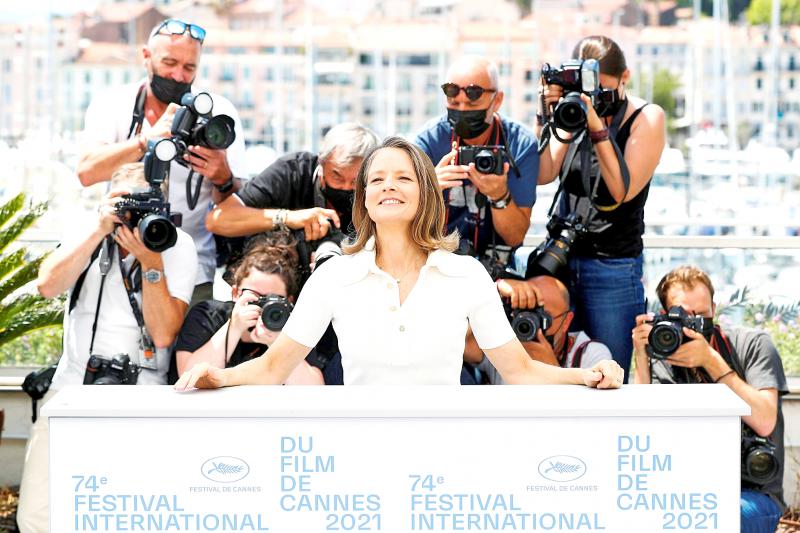There has never been a better time for women to enter the film industry, American superstar Jodie Foster told the Cannes festival on Wednesday, saying movies had too long been starved of female perspectives.
Addressing a large crowd of mostly young festival-goers in near-fluent French, she encouraged budding women filmmakers to seek their own truth and not try to please others.
“This is the moment for women to enter the industry,” Foster said.

Photo: Reuters
Although male domination of the industry had “not changed completely,” she said, “there is now an awareness that it’s been too long that we haven’t heard stories told by women... This is the moment.”
Foster received a lifetime achievement on Tuesday for her work that has included star turns in Taxi Driver and Bugsy Malone when she was a child, through to her Oscar-winning role in Silence of the Lambs. She has also directed several films, including Money Monster with George Clooney and Julia Roberts.
“I know it’s a bit cliche to say ‘tell your own stories,’” Foster said. “But what I mean is: ask yourself questions about the truthfulness of things and whether they resonate within you, instead of pleasing others, be it the public or producers.”
‘WORST REASON’
Foster said many young actors entered the movie business saying “I want to be looked at in my pretty clothes” which she said was the “worst reason” for taking up the profession.
“For some people it can take years, unfortunately, to cast off that armor that separates you from authenticity on the screen,” she said.
Talking about her own experience, Foster said Pedro Almodovar — who presented her with her honorary Palme the day before — was “the first feminist director for me.”
“It was the first time I’d seen films that talked about women in an authentic way,” she said of the legendary Spanish director, who has made women central to many of his films.
Foster called Almodovar an exception among male directors who “can’t easily transpose themselves into a woman’s body and ask themselves what the complicated and complex experience of a woman consists of.”
‘MALE CONFUSION’
Referring to her experience as a director, she said that there was still “confusion” in the male-dominated movie industry about how women exercise leadership positions.
“They don’t understand how women lead because they’ve never seen women lead,” she said of male producers. “They don’t know how to talk to women to convince them of something. They’re afraid because they don’t know how to deal with these situations.”
The Cannes film festival has raised eyebrows for including just four films by women directors in the list of 24 movies vying for the top Palme d’Or prize in the main competition.
The gender balance is tilted less towards men in the festival’s other competition categories, and the main jury this year is mostly female, including US star Maggie Gyllenhaal, Canadian-French singer Mylene Farmer and French-Senegalese director Mati Diop.
Only one woman has won the Palme d’Or in 73 editions of the festival — Jane Campion for The Piano in 1993.

Google unveiled an artificial intelligence tool Wednesday that its scientists said would help unravel the mysteries of the human genome — and could one day lead to new treatments for diseases. The deep learning model AlphaGenome was hailed by outside researchers as a “breakthrough” that would let scientists study and even simulate the roots of difficult-to-treat genetic diseases. While the first complete map of the human genome in 2003 “gave us the book of life, reading it remained a challenge,” Pushmeet Kohli, vice president of research at Google DeepMind, told journalists. “We have the text,” he said, which is a sequence of

On a harsh winter afternoon last month, 2,000 protesters marched and chanted slogans such as “CCP out” and “Korea for Koreans” in Seoul’s popular Gangnam District. Participants — mostly students — wore caps printed with the Chinese characters for “exterminate communism” (滅共) and held banners reading “Heaven will destroy the Chinese Communist Party” (天滅中共). During the march, Park Jun-young, the leader of the protest organizer “Free University,” a conservative youth movement, who was on a hunger strike, collapsed after delivering a speech in sub-zero temperatures and was later hospitalized. Several protesters shaved their heads at the end of the demonstration. A

In August of 1949 American journalist Darrell Berrigan toured occupied Formosa and on Aug. 13 published “Should We Grab Formosa?” in the Saturday Evening Post. Berrigan, cataloguing the numerous horrors of corruption and looting the occupying Republic of China (ROC) was inflicting on the locals, advocated outright annexation of Taiwan by the US. He contended the islanders would welcome that. Berrigan also observed that the islanders were planning another revolt, and wrote of their “island nationalism.” The US position on Taiwan was well known there, and islanders, he said, had told him of US official statements that Taiwan had not

We have reached the point where, on any given day, it has become shocking if nothing shocking is happening in the news. This is especially true of Taiwan, which is in the crosshairs of the Chinese Communist Party (CCP), uniquely vulnerable to events happening in the US and Japan and where domestic politics has turned toxic and self-destructive. There are big forces at play far beyond our ability to control them. Feelings of helplessness are no joke and can lead to serious health issues. It should come as no surprise that a Strategic Market Research report is predicting a Compound